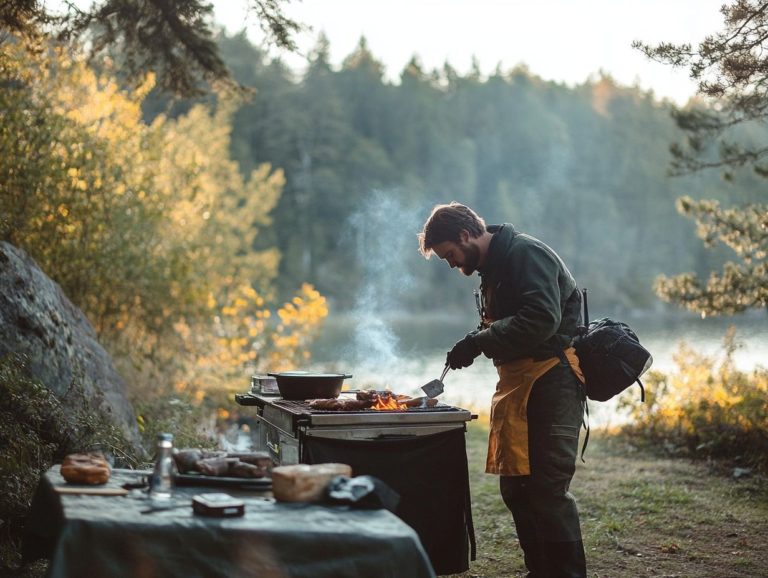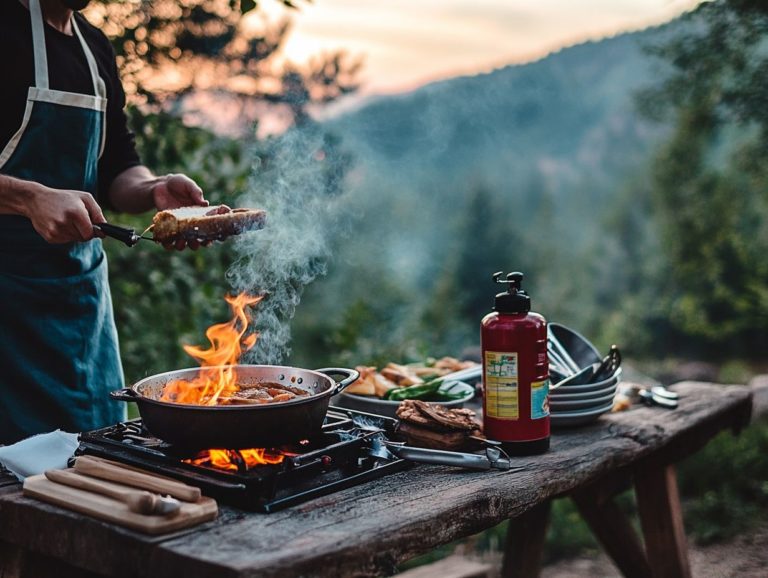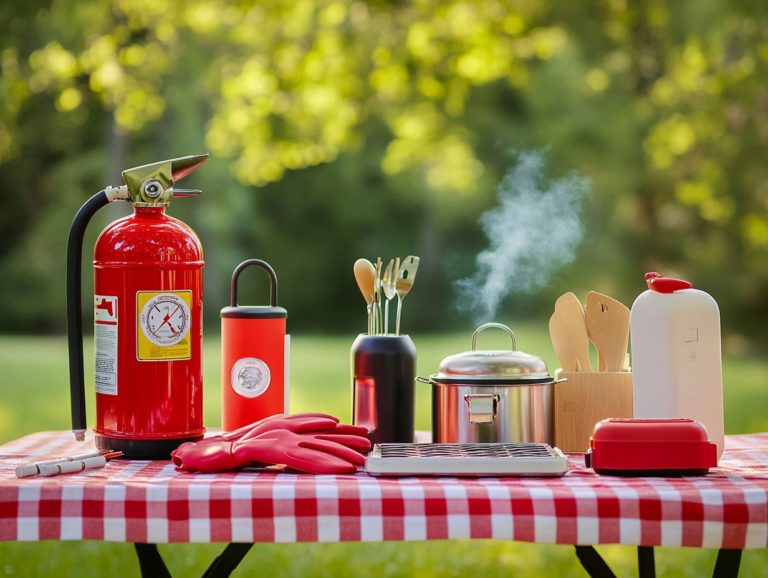Top 10 Outdoor Cooking Mistakes to Avoid
Grilling outdoors is a cherished tradition, but even the most experienced grillmasters can easily stumble into common pitfalls.
From failing to prep the grill properly to overlooking the seasoning of meat, these missteps can transform a promising cookout into a culinary disaster.
Here are the top ten outdoor cooking mistakes you should avoid, ensuring your next barbecue is a sizzling triumph. You ll discover valuable tips on essential tools, food safety, and how to achieve perfectly cooked meat every single time.
Contents
- Key Takeaways:
- 1. Not Preheating the Grill Properly
- 2. Using Too Much Charcoal
- 3. Not Cleaning the Grill Grates
- 4. Not Using Enough Oil on the Grill
- 5. Not Letting Meat Rest Before Cutting
- 6. Overcrowding the Grill
- 7. Not Checking the Temperature of the Meat
- 8. Not Using a Meat Thermometer
- 9. Not Using the Correct Cooking Method for Each Type of Meat
- 10. Not Seasoning the Meat Properly
- What Are the Benefits of Outdoor Cooking?
- Frequently Asked Questions
- What are the top 10 outdoor cooking mistakes to avoid?
- Why is it important to preheat the grill?
- Can using too much lighter fluid be dangerous?
- What is the best way to clean my grill grates?
- Why is seasoning the food important?
- How can I tell if my meat is cooked properly?
- What can happen if I overcrowd the grill?
- Why is it important to keep an eye on the grill?
- What can I do if I run out of fuel while cooking?
- Why should I let meat rest after cooking?
Key Takeaways:

- Preheat your grill properly for even cooking and fire safety.
- Use the right amount of charcoal or gas for consistent heat.
- Clean grill grates before and after cooking for food safety.
1. Not Preheating the Grill Properly
One of the most common mistakes you can make as a grillmaster, whether you’re a novice or a seasoned pro, is neglecting to preheat your grill properly. This mistake can ruin your meal! Ensuring your grill reaches the right temperature is crucial for achieving those coveted grill marks and that delicious, sweet smoky flavor that elevates your outdoor cooking experience. For more tips, check out the dos and don’ts of outdoor cooking.
Whether you re using a propane, charcoal, or electric grill, preheating allows the surface to hit optimal heat, guaranteeing a perfect sear on your meats and veggies. Each grill type has its own unique preheating needs. For example, propane grills generally take about 10 to 15 minutes to reach high heat, while charcoal grills need a thorough ash coating, which can take around 20 to 30 minutes. Don t underestimate electric grills either; they require about 10 minutes to get to the desired cooking temperature.
A common misconception is that skipping preheating saves time, but this can lead to sticking and diminished flavors. To check if your grill is ready, simply hold your hand above the grates if you can only keep it there for two seconds or less, it s go time. Skipping this vital step often results in undercooked food, lackluster flavors, and a fair bit of frustration for the grillmaster.
2. Using Too Much Charcoal
Using too much charcoal can lead to excessive heat and burnt food, making it one of the major grilling errors that could spoil your outdoor cooking experience. When grilling meats and veggies, understanding the right amount of charcoal is essential not just for managing heat, but also for practicing fire safety and ensuring even cooking across your grill surface.
Overloading your grill can turn cleanup into a hassle, as excess ash can clog vents and disrupt airflow. To find the right volume of charcoal, consider the type of food you’re grilling; larger cuts like brisket or whole chickens demand more heat and, consequently, more charcoal than lighter vegetables. The size of your grill also matters; a smaller grill might only need one container of charcoal to hold and light it, while a larger one could require two or more.
Effectively managing your charcoal means keeping an eye on cooking time adding a few briquettes every hour can help maintain optimal heat without overwhelming your food. Always prioritize safety by using long-handled tools when handling hot charcoal and ensuring proper airflow around the grill to prevent any fire hazards.
3. Not Cleaning the Grill Grates
Neglecting to clean your grill grates after each use can lead to a buildup of residue that not only compromises the flavor of your food but also poses health risks. For any dedicated grillmaster, this is a crucial step.
Regular cleaning ensures that your meats and veggies taste their absolute best and prolongs the life of your grill. By using the right tools, like a grate brush or scraper, you can maintain surfaces free from old flavors, ensuring that each grilling session concludes with that sweet, smoky satisfaction.
To keep your grill in top shape, it’s wise to clean the grates after every use, with a more thorough monthly scrub to tackle stubborn buildup. The materials of your grill should guide your choice of cleaning tools stainless steel calls for a sturdy brush, while porcelain grates benefit from softer bristles.
You might also consider techniques like heating the grill before cleaning; it can really help loosen grime. Prioritizing cleanliness not only elevates the taste and quality of your grilled dishes but also reduces the risk of foodborne illnesses. Maintenance becomes an essential practice for anyone serious about grilling.
4. Not Using Enough Oil on the Grill
Not using enough oil on your grill can lead to food sticking to the grates, which is a rookie mistake in the grilling world. Adequately oiling your grill not only keeps your meats and veggies from becoming tragically attached to the grates but also helps you achieve those beautiful grill marks that make your dishes Instagram-ready.
Whether you’re working with a juicy steak or fresh asparagus, a light coating of oil is essential for a flawless outdoor cooking experience. You have a variety of oils at your disposal that work wonders for grilling canola, grapeseed, and avocado oil are all excellent choices.
These oils boast high smoke points and impart subtle flavors that enhance your ingredients beautifully. For those who crave a robust taste, consider incorporating olive oil or nut oils, but be cautious; their lower smoke points require a bit more attention.
In terms of application, brushing oil directly onto the food or the grill grates before cooking ensures even distribution and optimal results. Mastering the balance between flavor and cooking performance can elevate your grilling skills to new heights.
For indirect grilling, a light spritz of oil on your food helps prevent moisture loss. For direct grilling, a well-oiled grate will create that coveted sear, locking in juices and enhancing every bite.
5. Not Letting Meat Rest Before Cutting
Failing to let your grilled meats rest before cutting can lead to a significant loss of flavor, diminishing what could otherwise be a delightful eating experience. This is a common pitfall many grillmasters encounter.
Allowing for carryover cooking, the process of meat continuing to cook after being taken off the grill, is essential. It lets the meat continue to cook while resting, tenderizing it and ensuring that the juices are evenly distributed.
When you finally slice into that perfectly grilled steak or chicken, you’ll appreciate the depth of flavor that this simple yet crucial step brings to your outdoor cooking.
To truly maximize the benefits of resting, different types of meat require varying amounts of time. A thick cut of beef might need at least 10 to 15 minutes, while chicken is perfectly content with about 5 to 10 minutes.
This difference is rooted in the science of carryover cooking, where residual heat keeps cooking the meat, especially in larger cuts. As the meat rests, the fibers relax, contributing to a juicy texture instead of a dry bite.
To maintain optimal warmth during this resting period, loosely covering the meat with aluminum foil can help prevent it from getting too cold. After resting, serving it alongside freshly prepared sides or drizzling it with a rich sauce can truly elevate the overall dining experience.
6. Overcrowding the Grill
Overcrowding the grill is a classic blunder that can throw a wrench in your quest for grilling perfection. When you cram too much food onto the grates, you risk lowering the temperature and hampering proper heat circulation. To ensure safety during your cooking adventures, consider using the top 10 safety gear for outdoor cooking adventures. The result? Burnt outsides and undercooked insides—definitely not the mark of a great grillmaster.
To achieve those coveted grill marks and that irresistible smoky flavor, it’s vital to give each piece of food enough space to breathe.
A well-organized grilling session can elevate your cooking experience. This allows for better heat distribution and more consistent results. Take the time to plan how much food you ll be grilling to ensure you don t overwhelm the surface.
Consider implementing a two-zone setup: one side for direct high heat and the other for indirect cooking. This strategy gives you better control over cooking times. You can sear your items on the hot side and then move them to the cooler zone as needed.
Rotating your items at intervals ensures they receive even exposure to heat. By avoiding overcrowding, you’ll enhance both flavor and texture, making each bite a delightful experience.
7. Not Checking the Temperature of the Meat

One of the most critical mistakes you can make while grilling is forgetting to check the meat’s temperature. This oversight can lead to undercooked or overcooked dishes, ultimately detracting from your outdoor cooking experience. To avoid such pitfalls, it’s essential to be aware of common outdoor cooking myths.
A meat thermometer is essential for aspiring grillmasters. It ensures your meats are cooked to perfection while avoiding the risks of serving them too hot or underdone.
Whether you’re grilling steaks, hot dogs, or veggies, a quick temperature check guarantees both safety and taste.
You’ll find a variety of meat thermometers designed to suit different cooking styles, including:
- Digital instant-read types
- Probe thermometers (a type that stays in the meat while it cooks, giving continuous readings)
- Smartphone-connected models
It’s important for grilling enthusiasts like you to be familiar with the recommended internal temperatures for various meats. For instance, poultry should reach at least 165 F, while steak is often best enjoyed at 145 F for that perfect medium-rare bite.
Using a thermometer not only enhances food safety by minimizing the risk of foodborne illnesses but also helps your meats retain their juices, enhancing both flavor and tenderness. Ultimately, getting the right temperature assures safety and elevates your entire dining experience to something truly exceptional.
8. Not Using a Meat Thermometer
Neglecting to use a meat thermometer ranks among the most critical grilling mistakes that can jeopardize the quality of your outdoor cooking. A quality meat thermometer is your best ally. It ensures that each grilling session delivers perfectly cooked meats whether it s a juicy steak or tender chicken while safeguarding against foodborne illness.
Understanding the correct temperatures for various meats, whether you re using a propane or charcoal grill, is essential for those who aspire to grillmaster status.
Always remember to test your grill before cooking to ensure it s at the right temperature!
These thermometers come in various types, including:
- Instant-read thermometers for rapid readings
- Probe thermometers for continuous monitoring
- Digital models for advanced features
Mastering the technique of inserting the thermometer into the thickest part of the meat avoiding any contact with bone is crucial for obtaining accurate readings.
Being mindful of safe cooking temperatures, such as 165 F for poultry, 145 F for pork, and 160 F for ground meats, empowers you to achieve the desired doneness. This elevates flavor and moisture retention while minimizing the risk of undercooking.
9. Not Using the Correct Cooking Method for Each Type of Meat
Using the wrong cooking method for each type of meat is a common grilling mistake that can lead to disappointing results and frustration for any aspiring grill master. It s vital for you to grasp the distinctions between direct heat (cooking with heat directly below the meat) and indirect heat (cooking the meat with heat coming from the side), as well as techniques like smoking, to elevate your meats to their peak flavor and texture.
Each type of meat has its own preferred cooking technique. Mastering the right one can yield succulent, perfectly grilled dishes that will leave your guests in awe.
For example, lean cuts like chicken breasts and fish fillets thrive on quick cooking over direct heat. This allows you to achieve a crispy exterior without the risk of drying them out. On the flip side, tougher meats such as brisket or ribs call for the low and slow method of indirect cooking, which breaks down the connective tissues for melt-in-your-mouth tenderness. Remember to flip once to ensure even cooking!
Incorporate wood chips for smoking during these extended cooks. This can infuse those rich flavors that enhance your overall cooking experience. When selecting your cooking approach, remember to consider the thickness and fat content of the meat, along with your desired flavor profile. This will ensure your grilling endeavors are nothing short of successful.
10. Not Seasoning the Meat Properly
One of the most crucial yet often overlooked aspects of grilling is the proper seasoning of meat, which can dramatically enhance your outdoor cooking experience. If you neglect to season your meats adequately or do so too early, you risk serving bland dishes.
It s essential for you, as a grill master, to grasp the art of seasoning. Whether you opt for dry rubs, marinades, or simply a generous sprinkle of salt and pepper, mastering the right techniques and timing can elevate your grilling from average to extraordinary.
Be sure to tenderize the meat before seasoning for maximum flavor absorption!
Exploring various methods like marinating meats in a harmonious blend of herbs and acids or experimenting with the vibrant flavors of dry rubs can unlock a world of culinary possibilities. The timing of when to apply these seasonings is equally important. For instance, marinating for hours not only tenderizes but infuses flavors, while dry rubs should ideally be applied well in advance to ensure proper absorption.
By paying attention to these nuances, you can significantly impact not only the taste but also the texture of your finished dish, achieving a mouthwatering result that truly delights the palate.
What Are the Benefits of Outdoor Cooking?
Outdoor cooking presents a wealth of benefits that not only elevate the flavor of your meals but also enrich your entire grilling lifestyle. It transforms the act of gathering with friends and family into a delightful cooking adventure. Imagine cooking in the fresh air, where the unique sweet and smoky flavor of grilled food turns mealtime into a cherished experience.
Grilling fosters connections and sparks creativity as you explore diverse cooking techniques and recipes, enhancing your culinary journey.
One of the most remarkable perks of cooking outdoors is the bonding it facilitates. Whether you’re inviting neighbors for a barbecue or sharing quality time with loved ones, the communal effort in meal preparation brings everyone closer. Plus, the physical activity associated with outdoor cooking naturally promotes a healthier lifestyle, nudging you toward more nutritious choices with fresh ingredients and lean meats.
Don’t forget to plan ahead and assess your grill setup to make the most of your time outside!
To truly elevate your outdoor cooking experience, consider investing in high-quality grilling tools, experimenting with marinades to infuse extra flavor, and incorporating seasonal vegetables into your dishes. This way, you can savor not only the delicious outcomes but also the beauty of nature surrounding you.
Try these methods at your next cookout and impress your guests!
What Are the Essential Tools and Equipment for Outdoor Cooking?
To truly relish the art of outdoor cooking, having the right tools and equipment is essential for you as a grillmaster. High-quality grilling utensils, reliable meat thermometers, and specialized gear like smokers and foil packets can make a world of difference. They help you achieve those coveted grill marks and ensure fire safety while you cook.
Investing in the right accessories enhances your grilling experience and guarantees your meats and veggies are prepared to perfection.
Among the critical tools, durable grill brushes are crucial for cleaning grates. They help prevent food from sticking and promote even cooking. A solid pair of heat-resistant gloves protects you from burns, ensuring your safety throughout the grilling process.
For those just starting out, a basic starter kit including tongs and a spatula will serve you well. More seasoned grillers might find it worthwhile to invest in cast iron cookware or a rotisserie attachment for added versatility.
Ultimately, a well-equipped grillmaster understands that the right combination of quality tools and a keen eye for safety can transform any grilling session into a delightful experience.
How Can One Ensure Food Safety When Cooking Outdoors?
Ensuring food safety while cooking outdoors is essential. It prevents foodborne illnesses and ensures everyone enjoys a healthy and delightful grilling experience. For beginners, following the top outdoor cooking safety tips is crucial. From selecting the right fuel to practicing fire safety, understanding key steps helps you avoid common mistakes.
Properly handling raw meats, storing ingredients appropriately, and thoroughly cleaning your grilling tools all contribute to a safe and enjoyable cooking space.
Being vigilant about safe meat handling is crucial. Always keep raw meats separate from ready-to-eat foods to prevent cross-contamination. Make it a habit to monitor temperatures using a meat thermometer, ensuring that poultry reaches at least 165 F and ground meats hit a safe 160 F.
Cleanliness cannot be overstated wash your hands frequently, use clean utensils, and sanitize surfaces after meal prep. By being mindful of these practices, you enhance your cooking experience and ensure your diners can savor every bite without a care in the world.
What Are Some Common Mistakes When Grilling Vegetables?

Many grillmasters tend to overlook the subtleties of grilling vegetables. This can lead to mistakes that diminish their flavor and texture think undercooking or, worse yet, burning them to a crisp. Grilling veggies demands understanding the right cooking times and techniques. Achieving that perfect tender, flavorful bite while flaunting those desirable grill marks is key.
Whether you re working with asparagus, potatoes, or a medley of seasonal delights, mastering the art of grilling vegetables elevates your outdoor cooking game to new heights. Don t miss out on using foil packets they make cleanup a breeze and pack in flavor!
To ensure even cooking, cut your vegetables into uniform sizes. This promotes consistent heat distribution and avoids the dreaded half-raw, half-charred conundrum. Don t underestimate the power of a good marinade or a simple drizzle of olive oil, salt, and herbs to enhance their flavor.
Utilizing skewers or grilling baskets can save those smaller pieces from the dreaded fall-through. It also allows for proper air circulation, ensuring even grilling. Keep a vigilant eye on the grill temperature; medium heat generally delivers the best results, allowing for lovely caramelization without crossing into charred territory.
Use these strategies to turn your side dish into the star of the grill!
How Can One Achieve Perfectly Cooked Meat on the Grill?
Achieving perfectly cooked meat on the grill is truly an art form that blends various techniques, a good dose of patience, and a solid grasp of meat science. This combination ensures that every bite is tender and bursting with flavor. By mastering the right cooking methods and effectively utilizing the residual heat that continues to cook the meat after you remove it from the grill, you can take your outdoor grilling to a whole new level!
Properly seasoning your meat and cooking it at the right temperatures can completely transform your grilling experience. Your guests will be impressed with every meal.
To refine these skills even further, consider the unique needs of different types of meat. Red meats often thrive with marinating or dry rubs, enhancing their natural flavors with delightful herbs and spices. Poultry, however, demands careful attention to ensure it reaches a safe internal temperature without drying out.
This is where a reliable meat thermometer becomes your best friend offering precise readings that keep each cut juicy and flavorful. Understanding doneness levels gives you the power to know exactly when to remove the meat from the heat. This ensures everyone can savor that perfect level of pink or desired texture in every bite.
What Are Some Tips for Cleaning and Maintaining a Grill?
Regularly cleaning and maintaining your grill is essential for ensuring its longevity and best performance, solidifying it as a crucial part of your routine as a grillmaster. By implementing effective cleaning strategies like tackling the grates and using the right tools you’ll elevate your grilling experience while keeping your outdoor cooking space hygienic.
A well-maintained grill enhances the flavors of your food and prevents harmful residue build-up that could pose health risks. It’s important to establish a cleaning schedule tailored to your specific grill type. Gas grills, for example, may need different tools and cleaning frequencies compared to charcoal or pellet models.
Employing specialized tools like grill brushes and cleaners is crucial. Adopting best practices such as scraping the grates while they’re still warm greatly enhances the efficiency of your cleaning efforts. Regular maintenance boosts your cooking efficiency and ensures safety by minimizing the risk of flare-ups caused by grease buildup.
Frequently Asked Questions
What are the top 10 outdoor cooking mistakes to avoid?
- Not preheating the grill
- Using too much lighter fluid
- Not cleaning the grill grates
- Not properly seasoning the food
- Not flipping the food enough
- Not using a meat thermometer
- Not allowing meat to rest after cooking
- Overcrowding the grill
- Not having enough fuel
- Not keeping an eye on the grill at all times
Why is it important to preheat the grill?
Preheating the grill allows it to reach the right cooking temperature and helps prevent food from sticking to the grates. It also ensures even cooking and reduces the risk of foodborne illnesses.
Can using too much lighter fluid be dangerous?
Yes, using too much lighter fluid can be dangerous as it can cause flare-ups and even explosions. It can also leave a chemical taste on the food.
What is the best way to clean my grill grates?

The best way to clean grill grates is to use a wire brush while the grill is still warm. This will help remove any stuck-on food or debris. You can also use a ball of aluminum foil to scrub the grates.
Why is seasoning the food important?
Seasoning the food before cooking adds flavor and helps prevent it from drying out. It also helps create a nice crust on the outside of the food.
How can I tell if my meat is cooked properly?
The most accurate way to tell if your meat is cooked properly is by using a meat thermometer. Different types of meat have different safe internal temperatures, so it’s important to use a thermometer to ensure it is safe to eat.
What can happen if I overcrowd the grill?
If you overcrowd the grill, the food will not cook evenly, and it can also cause flare-ups. This can result in burnt or raw spots on the food and a longer cooking time.
Don’t miss out on impressing your guests! Ready to become a grilling pro?
Why is it important to keep an eye on the grill?
Always keep an eye on the grill. This helps prevent accidents like flare-ups and uncontrolled fires.
What can I do if I run out of fuel while cooking?
Have a backup plan ready! You can use a stovetop or oven to finish cooking your food.
Always keep extra fuel on hand for emergencies.
Why should I let meat rest after cooking?
Letting meat rest helps the juices spread out. This makes your meal juicy and flavorful.
It also keeps the meat tender, preventing it from drying out.






